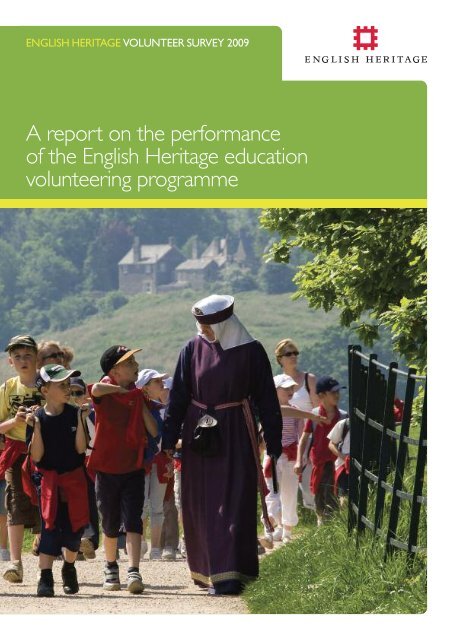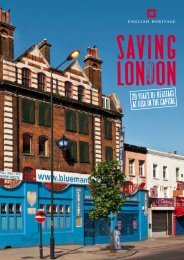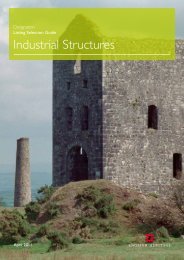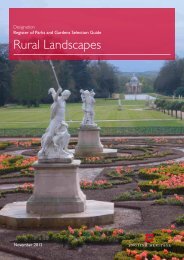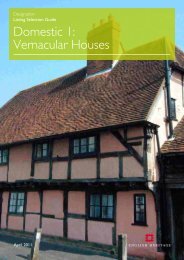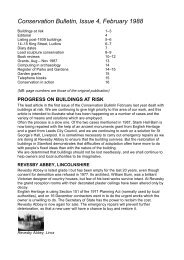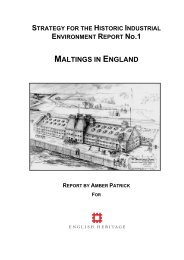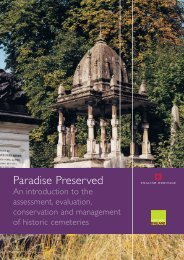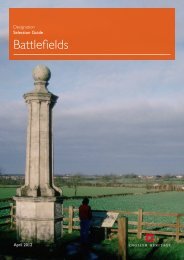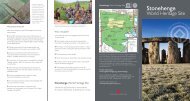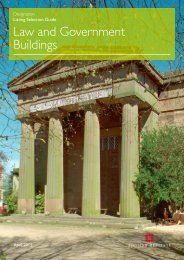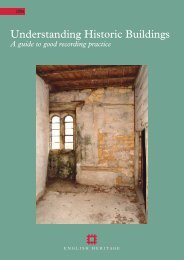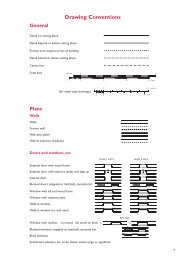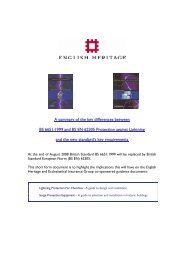PDF | 809.00 KB - English Heritage
PDF | 809.00 KB - English Heritage
PDF | 809.00 KB - English Heritage
Create successful ePaper yourself
Turn your PDF publications into a flip-book with our unique Google optimized e-Paper software.
ENGLISH HERITAGE VOLUNTEER SURVEY 2009<br />
A report on the performance<br />
of the <strong>English</strong> <strong>Heritage</strong> education<br />
volunteering programme
Kate Davies<br />
Education Volunteers Manager<br />
November 2009<br />
Foreword<br />
Since launching the education volunteering programme the Education<br />
department has strived to create a scheme that represents the needs of its<br />
volunteers – listening to opinions, understanding needs and recognising skills<br />
and experience. Following on from the evaluation of the pilot education<br />
volunteering programme (conducted in 2007, published in May 2008) the<br />
2009 Volunteer Survey demonstrates our commitment to continually listen to<br />
volunteers and adapt and improve the educational volunteering programme.<br />
The findings of this report demonstrate that everyone involved in the<br />
programme is working hard to ensure education volunteers are well supported<br />
and managed and have a worthwhile and enjoyable experience with <strong>English</strong><br />
<strong>Heritage</strong>. I would like to thank everyone involved in the programme for<br />
ensuring its continued success.<br />
I would also like to make a special thank you to our education volunteers<br />
across the country who are bringing our historic properties alive to visiting<br />
school children, passing on their enthusiasm to the next generation. It is their<br />
dedication, skills and experience that makes our education programme such<br />
an enriching and enjoyable experience for those participating.<br />
Acknowledgements<br />
Thanks are due to a number of people for their help in the production of this document.<br />
Firstly to Rebecca Brough, Education Liaison Officer for the South West who produced the<br />
online survey questionnaire completed by the volunteers and collated the results. Also to Tina<br />
Corri, Head of Education and Hilary Jones, Education Publishing Co-ordinator who both<br />
edited this report. And finally to the volunteers who took the time to complete the<br />
questionnaire and share their thoughts and experiences.<br />
01
Executive Summary<br />
Overall the 2009 survey revealed extremely positive attitudes towards being an education volunteer:<br />
THE RECRUITMENT PROCESS<br />
The interview, recruitment and induction processes were all seen very favourably.<br />
REASONS FOR VOLUNTEERING<br />
Many of the volunteers had joined the programme due to a strong interest in education or history.<br />
VOLUNTEER ROLES AND EXPERIENCES<br />
Volunteers felt they had largely been made to feel welcome and that their ideas were listened to.<br />
Many volunteers also found the social aspects of the role very enjoyable.<br />
Volunteers mainly felt well-prepared for their role and were very satisfied with the support that they<br />
received from the <strong>English</strong> <strong>Heritage</strong> Education team and Volunteers Manager.<br />
If anything, volunteers would like to spend more time than they currently did volunteering and many<br />
expressed the desire for their volunteer role to expand to encompass additional responsibilities beyond<br />
those associated with Discovery Visits for school groups (interactive, curriculum-linked sessions).<br />
The few areas for development of the programme that were expressed in the survey were mainly caused<br />
by the long gaps between volunteering sessions and practical issues (for example storage of resources)<br />
which will need to be investigated and addressed on a site by site basis.<br />
COMMUNICATION<br />
There was a marked difference between the popularity of the different methods of communicating to<br />
volunteers. The education volunteers newsletter was very popular whereas an online forum (Google<br />
group) was largely un-used.<br />
RECOMMENDATIONS<br />
Look at methods of advertising volunteer opportunities and think about how best to use them<br />
in recruitment.<br />
Maintain current levels of overall volunteer satisfaction.<br />
Diversification of volunteer roles.<br />
Diversification of volunteer profile.<br />
Resolve practical and site-specific issues, for example storage.<br />
Build on the successes of communicating with and connecting volunteers for example through<br />
the education volunteers newsletter.<br />
02
Highlights<br />
8<br />
7<br />
1<br />
PHASE 1 (2006–07)<br />
1 Bolsover Castle<br />
2 Kenwood House<br />
3 Pendennis Castle<br />
4 Great Yarmouth Row Houses*<br />
5 Goodrich Castle<br />
6 Fort Brockhurst<br />
7 Brodsworth Hall & Gardens<br />
PHASE 2 (2008–09)<br />
8 Warkworth Castle<br />
9 Audley End House<br />
10 Battle Abbey<br />
11 Portchester Castle<br />
PHASE 3 (2010–11)<br />
12 Stonehenge & Old Sarum<br />
13 Wrest Park<br />
3<br />
12<br />
5<br />
11<br />
13 9<br />
2<br />
6<br />
10<br />
4<br />
Since its launch in 2006 the education volunteers programme has continued to grow from strength to<br />
strength. Currently running at ten <strong>English</strong> <strong>Heritage</strong> sites across the country, we have a team of over 80<br />
committed volunteers who either assist or lead Discovery Visits, working on an ‘on-call’ basis. Volunteers<br />
lead 16 Discovery Visits (of which 12 were developed in partnership with volunteers) and support a<br />
further five staff-led Discovery Visits. We are currently planning to expand the programme to include<br />
Stonehenge and Old Sarum in 2010 and Wrest Park in 2011.<br />
Since the last volunteer survey was conducted in<br />
2007 there have been a number of highlights for the<br />
education volunteering programme including:<br />
ENGAGEMENT & IMPACT<br />
The development, piloting and launch of 12<br />
volunteer-led Discovery Visits.<br />
Over 2700 hours of voluntary work reported by<br />
education volunteers from 2007-08 and 3000<br />
hours from 2008-09. (Note: this is likely to be<br />
conservative figure).<br />
An education volunteer from Kenwood House<br />
won the Marsh Volunteers for Museum Learning<br />
Award (London Region) which recognises best<br />
practice and innovative ways volunteers work in<br />
museums in June 2009.<br />
Volunteers contributed to the quality and<br />
excellence of our educational services recognised<br />
through Sandford Awards at seven properties<br />
where education volunteers are based.<br />
The Education Volunteers Manager shared<br />
the findings of the evaluation at the Group for<br />
Education in Museums Conference Volunteering<br />
for Learning.<br />
A new one-day training workshop on “Managing<br />
Volunteers” has been developed as part of the<br />
<strong>English</strong> <strong>Heritage</strong> management development<br />
programme for staff.<br />
CONNECTING VOLUNTEERS<br />
The development of an education volunteer<br />
newsletter published twice yearly.<br />
The production of new ‘yellow’ volunteer pass to<br />
be issued to volunteers after completing 60 hours<br />
of volunteering giving them access to all<br />
<strong>English</strong> <strong>Heritage</strong> properties.<br />
Volunteering has led to employment for three<br />
education volunteers at <strong>English</strong> <strong>Heritage</strong> and has<br />
also encouraged a number of others to seek<br />
careers in the heritage sector.<br />
PRACTICE-SHARING<br />
The publication of the evaluation of the pilot<br />
education volunteering programme in May 2008<br />
found that <strong>English</strong> <strong>Heritage</strong> had successfully<br />
implemented the programme across seven sites in<br />
its pilot year and volunteers had made a tangible<br />
difference to its education provision.<br />
* Programme at Great Yarmouth Row Houses ended in 2009<br />
03
Methodology & Findings<br />
The survey took the form of an online questionnaire carried out during September 2009. All volunteers<br />
were either sent a link to the survey in an email or a hard-copy of the questionnaire. The survey was<br />
made up of six sections covering: the recruitment process, reasons for volunteering, views about their<br />
volunteer role, experiences as education volunteers, communication and personal information. A total<br />
of 55 respondents, all of whom were current or had recently left their role as education volunteers,<br />
took part in the survey. Volunteers working on all sites where the programme exists were among the<br />
respondents, except for Battle Abbey where volunteers were recruited shortly before the survey took<br />
place. All other sites had levels of respondents that were in proportion to the numbers of volunteers<br />
currently involved at the site. For consistency, many questions used in the pilot evaluation were repeated<br />
to allow year-on-year comparison of the programme.<br />
SECTION 1<br />
THE RECRUITMENT PROCESS<br />
Promoting volunteering<br />
Most volunteers had heard about available education<br />
volunteer roles in the local press (32%). This was<br />
followed by the <strong>English</strong> <strong>Heritage</strong> website (15%) and<br />
<strong>Heritage</strong> Today (11%).<br />
Other less popular recruitment methods included:<br />
Writing to local <strong>English</strong> <strong>Heritage</strong> members in the<br />
area when trying to attract new volunteers 7.5%<br />
Advertising vacancies using posters at an <strong>English</strong><br />
<strong>Heritage</strong> property 9%<br />
Displaying posters in the local community 6%.<br />
When respondents were asked for their ideas about<br />
how to advertise opportunities to potential<br />
volunteers, several of them thought approaching<br />
nearby universities may be a good idea and it was<br />
felt that doing this may help to engage some<br />
younger volunteers.<br />
Respondents felt the most important factor which<br />
could positively influence a potential volunteer’s<br />
decision to apply for a vacancy was if they were able<br />
to meet existing volunteers face to face (62%). 42%<br />
also mentioned that they would like to hear a talk or<br />
meet with an existing volunteer. No volunteers had<br />
heard about volunteering opportunities on the radio<br />
(despite several radio interviews having been done in<br />
previous recruitment campaigns). 39% mentioned that<br />
they would like to read case studies of volunteers. The<br />
least popular option was glossy publicity brochures.<br />
Interviews & information<br />
When asked about their opinion of the interview<br />
and recruitment process for education volunteers,<br />
responses were very positive, with 83% saying that ‘It<br />
was all just right’ and 33% that the process was<br />
efficient. The only significant negative was that 12%<br />
felt that the process was too slow. Volunteers were<br />
similarly content with the information that they had<br />
obtained before they applied to become an<br />
education volunteer. 84% of respondents agreed or<br />
strongly agreed that the information had been easy<br />
to find, 85% that it was in the right amount of detail,<br />
87% that it was fully accessible and 76% that it had<br />
the right balance of written and visual content.<br />
SECTION 2<br />
REASONS FOR VOLUNTEERING<br />
The majority of education volunteers were not new<br />
to volunteering when they joined the programme.<br />
72% had already volunteered for another<br />
organisation or had been volunteers for <strong>English</strong><br />
<strong>Heritage</strong> before. In terms of the motivating factors in<br />
their decision to become an education volunteer,<br />
‘interest in the history of the site’ was the top<br />
answer, followed by the opportunity to use ‘existing<br />
skills and experience’ and then ‘developing new skills’.<br />
While personal development was therefore a very<br />
important factor for many volunteers, this was not to<br />
do with making themselves ‘more employable’, which<br />
ranked markedly lower than any of the other ten<br />
factors in the question. It seems that it was more to<br />
04
do with lifelong learning and personal enrichment.<br />
This may be representative of the fact that some of<br />
the volunteers have retired from paid employment.<br />
SECTIONS 3 & 4 (see tables 1–3, pages 8 & 9)<br />
VOLUNTEER ROLES AND EXPERIENCES<br />
Length of service<br />
The majority (55%) of volunteers had been involved<br />
with the Education Volunteer programme for more<br />
than one year and 29% had been volunteering for<br />
more than two years. Newer volunteers were still<br />
represented, however, with 18% having joined within<br />
the last 6 months.<br />
Regularity of volunteering<br />
When asked how often they volunteered, many<br />
respondents found it difficult to provide a<br />
straightforward answer and 42% chose ‘other’ as their<br />
answer. Of those who specified a reason for this,<br />
many said that it varied greatly ‘as and when’ school<br />
bookings arose. There was evidence, however, that<br />
many volunteers were involved on a regular basis.<br />
48% of respondents said that they worked once a<br />
month or more often and 21% were involved at<br />
least once a week.<br />
Travel<br />
On each occasion that they volunteered, the vast<br />
majority (78%) spent less than 1 hour in total<br />
travelling to and from the site. When asked about<br />
the time they usually spent working on site, 50%<br />
stated that this was usually 2-3 hours. 17% said that<br />
they spent more than 4 hours on site each time.<br />
Time commitment<br />
Volunteers’ opinions about the amount of time that<br />
they currently spent on education volunteering were<br />
generally very positive. 57% stated that the amount of<br />
time they currently spent was about right. No<br />
volunteers said that they would like to do fewer hours<br />
but 26% said that they would like more hours. Of<br />
those respondents who answered ‘other’, several<br />
noted that while they were happy with the amount of<br />
time spent on each occasion, the infrequency of<br />
occasions was a shame as they would have liked to be<br />
involved more often. In particular, 63% of the Bolsover<br />
Castle respondents and 50% of Pendennis Castle<br />
respondents said that they would like to do more.<br />
Satisfaction levels<br />
Volunteers were asked to rate their satisfaction with<br />
various aspects of the volunteer programme. Top of<br />
their list was the support they received from the<br />
Education Volunteers Manager. All volunteers were<br />
satisfied with this aspect and 71% were ‘very satisfied’.<br />
The second element they were most happy with was<br />
the support they received from the regional<br />
education team and third was the induction process.<br />
In general, volunteers were satisfied with every aspect<br />
that they were asked to rate, with only very few<br />
expressing dissatisfaction. The highest levels of<br />
dissatisfaction, which were still very low, were<br />
‘resources and materials to support your work’<br />
(5% dissatisfied) and ‘support received from site<br />
staff’ (4% dissatisfied).<br />
05
Findings continued<br />
Positive experiences<br />
When asked the extent to which they agreed or<br />
disagreed with positive statements about their<br />
experience as education volunteers, the vast majority<br />
of respondents agreed with each statement.<br />
Those which received the most positive response<br />
were:<br />
having the opportunity to ‘contribute their<br />
ideas/being listened to’ and<br />
feeling ‘valued and welcomed by other education<br />
volunteers’ (53% strongly agreed with each).<br />
Other very positive responses were given for:<br />
‘knowing the right person to approach’ with a<br />
problem,<br />
having ‘ownership’ over what they do and<br />
feeling ‘valued and welcomed by the staff at<br />
the site’.<br />
Slightly more negative overall, but still with the vast<br />
majority of volunteers agreeing included:<br />
‘volunteers and site staff being clear about their<br />
respective roles’,<br />
‘understanding the overall aims of <strong>English</strong><br />
<strong>Heritage</strong>’ and<br />
feeling ‘valued by <strong>English</strong> <strong>Heritage</strong> as an<br />
organisation’.<br />
Preparation for role<br />
When asked to think specifically about the role that<br />
they had been assigned on their site, almost all said<br />
that they felt that they had been well-prepared for<br />
the role and had a clear idea of what was expected<br />
of them. While the majority felt that their role had<br />
the right level of interest and challenge, 13% said that<br />
this was not the case and 20% said that their role<br />
didn’t give them enough to get their teeth into. 15%<br />
felt that their role would benefit from being more<br />
clearly defined.<br />
Expectations<br />
All respondents considered that education<br />
volunteering had at least partly met their<br />
expectations. 80% of volunteers said that their<br />
experience had fully met their expectations with<br />
18% saying that it had exceeded them.<br />
Best bits<br />
Asked an open-ended question about what they<br />
enjoyed most about being an education volunteer, a<br />
wide variety of answers were given. There were<br />
some common themes, however. Many volunteers<br />
mentioned the social aspect of their work with<br />
comments such as ‘meeting people, banter with<br />
friends who volunteer’ and ‘listening to other<br />
people’s experiences and points of view’. Working<br />
with children was also mentioned by several<br />
respondents as was being involved in education or<br />
imparting knowledge. Team working was also<br />
mentioned many times along with learning about the<br />
site or ‘indulging my love of history’.<br />
Worst bits<br />
Another open-ended question, this time concerning<br />
what volunteers least enjoy about being an<br />
education volunteer brought a similarly wide-ranging<br />
response. This time there seemed to be few<br />
common themes although several respondents did<br />
mention bad weather and long gaps between<br />
bookings as negative parts of their role. Other<br />
complaints were quite specific to the individual and<br />
the site such as ‘carrying heavy tables’ and<br />
‘frustration with storage’.<br />
Future ideas<br />
Responses to the question ‘How would you like to<br />
see your education volunteer role develop in the<br />
future?’ showed an overwhelming desire to do more<br />
and get involved. There were many mentions of<br />
wanting Discovery Visit bookings more often so that<br />
volunteering could be more frequent, whereas<br />
others would like to see their role expanding to<br />
cover general site volunteering or even to cover<br />
education activity at other sites nearby. Other<br />
volunteers would like to be more involved in the<br />
development of new sessions or research. When<br />
asked to note down anything that they would like to<br />
06
change about their volunteer role, many volunteers<br />
stated that they would not really change anything.<br />
Those who did comment gave some negative points<br />
such as ‘to make the work more variable – it can be<br />
quite dull giving the same Discovery Visit four times a<br />
day’ while others gave suggestions ‘A little more of<br />
the role playing for children, more participating<br />
rather than just listening’. Others were extremely<br />
positive comparing their voluntary experience with<br />
<strong>English</strong> <strong>Heritage</strong> to other volunteering experiences<br />
in <strong>English</strong> <strong>Heritage</strong>’s favour.<br />
SECTION 5 (see table 4, page 9)<br />
KEEPING VOLUNTEERS INFORMED<br />
Volunteers were asked about the usefulness of<br />
communication tools designed to improve the<br />
exchange of information between volunteers and staff.<br />
78% of the respondents had never used the online<br />
forum the ‘Education Volunteers Google group’ and<br />
only 2% said that they had used it frequently. Of those<br />
who had used it, however, only half said that they felt<br />
confident about how to use it and less than half would<br />
actually like to contribute to it.<br />
Over half expressed an interest in contributing to the<br />
newsletter. 85% said that they would like to see the<br />
inclusion of more articles by volunteers themselves.<br />
Opinions were split over the frequency of the<br />
newsletter with 35% saying it should come out more<br />
frequently than twice a year. Respondents were happy<br />
with the balance of pictures and text in the<br />
publication. When asked for their open-ended<br />
suggestions, one volunteer commented ‘Articles from<br />
key <strong>English</strong> <strong>Heritage</strong> staff supporting and commenting<br />
constructively on the contribution of volunteer<br />
projects would enable the volunteer staff to feel<br />
valued and an integral part of the organisation.’<br />
SECTION 6<br />
VOLUNTEER PROFILE<br />
83% of the respondents were female and all<br />
described their ethnicity as white. 52% of volunteers<br />
surveyed were under 60 and therefore of<br />
employment age only 10% of these were under 34.<br />
4% of volunteers considered themselves to<br />
have a disability.<br />
Opinions of the education volunteer newsletter<br />
(introduced following the evaluation of the pilot<br />
volunteering programme), however, were much<br />
more positive. All of the respondents had seen<br />
it before and 98% thought that it was useful.<br />
07
TABLE 1<br />
VOLUNTEER SATISFACTION WITH THE INFRASTRUCTURE<br />
OF THE EDUCATION VOLUNTEERING PROGRAMME<br />
Please indicate how satisfied you are with the following aspects of the Education Volunteer programme*<br />
Recognition for the work you do<br />
Amount of communication from <strong>English</strong> <strong>Heritage</strong><br />
Support received from Education Volunteers Manager<br />
Support received from regional education team<br />
(Education Manager and Liaison Officers)<br />
Support received from site staff<br />
Resources and materials to support your work<br />
Training<br />
Induction<br />
Application and recruitment process<br />
3.1 3.2 3.3 3.4 3.5 3.6 3.7 3.8<br />
TABLE 2<br />
VOLUNTEER EXPERIENCE<br />
Please indicate, from your experience of being an Education Volunteer, the extent to which you agree or disagree*<br />
with each of the following statements<br />
I feel valued by <strong>English</strong> <strong>Heritage</strong> as an organistion<br />
I feel part of <strong>English</strong> <strong>Heritage</strong> as an organistion<br />
I feel I understand overall <strong>English</strong> <strong>Heritage</strong> aims<br />
I feel that my skills are being developed<br />
I feel I have ownership of what I<br />
do as an Education Volunteer<br />
I feel that I have the opportunity to contribute<br />
my ideas and that I am listened to<br />
If I had a problem related to my volunteering,<br />
I would know the right person to approach<br />
The Education Volunteers and site staff<br />
are clear about their respective roles<br />
I feel valued and welcomed by<br />
the other Education Volunteers<br />
I feel valued and welcomed by the staff at the site<br />
2.9 3.0 3.1 3.2 3.3 3.4 3.5 3.6<br />
08
TABLE 3<br />
VOLUNTEERS’ SATISFACTION WITH THEIR ROLES<br />
Regarding the specific role you have been assigned at your site, please indicate the extent to which you agree or<br />
disagree with the following statements<br />
My role is not flexible enough<br />
My role would benefit from being more clearly defined<br />
My role has the right level of interest and challenge<br />
My role doesn’t give me enough to get my teeth into<br />
My role is too difficult and demanding<br />
I have a clear idea of what is expected of me in my role<br />
I feel that I have been well-prepared for my role<br />
0 0.5 1.0 1.5 2.0 2.5 3.0 3.5<br />
* With questions involving agree/disagree answer a numerical rating is given to each possible response – ‘Strongly agree’ has been given the value 4, ‘agree’<br />
the value 3, ‘disagree’ is 2 and ‘strongly disagree’ is 1. By adding these all together and then dividing by the total number of respondents answering the<br />
question (not including those who answered N/A), an average is calculated. The decimal number at the bottom of the chart is the average.<br />
TABLE 4<br />
VOLUNTEER AGE<br />
How old are you?<br />
18-24 3.7%<br />
25-34 5.6%<br />
35-44 16.7%<br />
45-59 25.9%<br />
60 and over 48.1%<br />
09
How do the findings compare with<br />
2007 volunteer survey?<br />
On the whole the findings are very similar.<br />
There hasn’t been a significant shift in why people volunteer as two out of the top three reasons for<br />
volunteering are the same in both surveys – ‘using my existing skills and experience’ and ‘developing<br />
new skills’.<br />
There also hasn’t been any change in the most popular ways volunteers heard about volunteering<br />
opportunities – with the <strong>English</strong> <strong>Heritage</strong> members magazine ‘<strong>Heritage</strong> Today’, the <strong>English</strong> <strong>Heritage</strong><br />
website and local press all featuring prominently.<br />
When the 2007 survey was conducted it was still very early in the volunteering programme and many<br />
volunteers had not settled into a fixed pattern of volunteering nonetheless, as in 2009, most people felt<br />
that the time they were spending was about right.<br />
Some volunteers in 2007 said they would be happy doing more and this was even more apparent in<br />
the 2009 findings.<br />
The volunteers’ views about the arrangements that had been put in place to recruit, train and support<br />
them had not really changed between 2007 and 2009.<br />
Most volunteers had a positive experience of the programme’s infrastructure and no-one was dissatisfied<br />
with any aspect.<br />
Finally, there hasn’t been a marked shift in the demographic of the volunteer community, although the<br />
identification of new groups and volunteer roles may change this.<br />
Progress made since 2007<br />
One area that was identified for improvement in<br />
2007 was that information needs were not being<br />
met fully by the induction process. This seems to<br />
have been fully resolved as all volunteers were<br />
satisfied or very satisfied with the induction process<br />
and the vast majority were also happy with the<br />
training provided.<br />
The 2007 survey identified that clearer lines of<br />
communications were needed between volunteers<br />
and staff as the complex volunteer support network<br />
of site staff, regional education staff and a national<br />
Volunteer Manager was often complicated and<br />
confusing. However, the 2009 survey demonstrates<br />
that much of this has been resolved and there is a<br />
marked improvement in this area with the majority<br />
of volunteers stating that they know the right<br />
person to approach with a problem. This in part is<br />
likely to be due to the more integrated role of<br />
regional Education Liaison Officers who contribute<br />
to the induction process and support volunteers<br />
to a greater extent.<br />
The education volunteers newsletter and the online<br />
forum were set up as a response to the 2007<br />
findings, and although the online forum has proved<br />
largely ineffective and has since been closed down<br />
the newsletter has been hugely popular.<br />
Overall, the programme has built on the success of<br />
the pilot and is well prepared for the future.<br />
10
Conclusion & Recommendations<br />
The findings of the 2009 survey are overwhelmingly<br />
positive and demonstrate that the programme is<br />
performing well. This survey will be used to inform<br />
the future development of the education<br />
volunteering programme at <strong>English</strong> <strong>Heritage</strong>.<br />
RECOMMENDATIONS<br />
1 Utilise the best methods of<br />
promoting volunteering<br />
The results show the importance of not only<br />
maintaining the information on the <strong>English</strong><br />
<strong>Heritage</strong> website but also keeping it as up to date<br />
as possible, as well as trying to get print media<br />
coverage of upcoming opportunities. Findings also<br />
suggest that posters and letters to members,<br />
although a valid and valuable recruitment method,<br />
may not be as effective as we had thought and<br />
that we could revisit the time spent on these.<br />
Volunteer thoughts on recruitment information<br />
suggests that although printed recruitment<br />
literature was important most people felt case<br />
studies and comments from actual volunteers<br />
were more valuable.<br />
2 Maintain current levels of overall volunteer<br />
satisfaction and diversify education<br />
volunteer roles<br />
The vast majority of volunteers are happy with<br />
their role although there is an underlying feeling<br />
that some volunteers would like to do more<br />
(either for the education department or more<br />
generally for <strong>English</strong> <strong>Heritage</strong>). This feeling could be<br />
linked to infrequent Discovery Visit bookings or<br />
volunteers might be based at properties that are<br />
closed during the winter months.<br />
3 Improve the diversity of education volunteers<br />
More than half of all education volunteers are<br />
under the age of 60 which is a successful step<br />
towards age diversity when taking into account<br />
that all education volunteer roles require availability<br />
during weekdays. Although the volunteering<br />
opportunities manage to attract people from a<br />
wide variety of ages it is less successful attracting a<br />
more diverse range of people. In any future<br />
expansion of the programme <strong>English</strong> <strong>Heritage</strong><br />
should try to increase the diversity of those who<br />
volunteer, in order to more accurately reflect the<br />
population as a whole.<br />
4 Resolve practical and site-specific issues, for<br />
example storage<br />
The few areas for development that were<br />
expressed in the survey were mainly caused by<br />
practical issues that need to be assessed on a site by<br />
site basis. Examples of these issues include the<br />
limited storage facilities for resources that volunteers<br />
use as part of the Discovery Visits they deliver.<br />
5 Build on the successes of communicating with<br />
and connecting volunteers<br />
Volunteers liked to be kept informed of news and<br />
stories from other volunteers, the education team<br />
and more generally with news about <strong>English</strong><br />
<strong>Heritage</strong>. This is an area for improvement in the<br />
future as there is demand amongst volunteers to<br />
increase their knowledge and engagement with<br />
<strong>English</strong> <strong>Heritage</strong>’s wider role and overall aims.<br />
11
Appendix 1<br />
Current Volunteers by Site<br />
A special thank you to all of the education volunteers currently participating in the programme<br />
AUDLEY END HOUSE<br />
Christine Greet<br />
Helen McKavney<br />
Jeanette Fulcher<br />
Julie Fellows<br />
Patricia Carter<br />
Diana Harrison<br />
Pamela Russell<br />
Geraldine Cowell<br />
Kate Faircliffe<br />
Anne Rhodes<br />
Patricia Brown<br />
Sandra Turner<br />
Judith Roberts<br />
BATTLE ABBEY<br />
Pamela Bourne<br />
Melvyn Nolan<br />
Sheila Clements<br />
Barbara Kaliniecka<br />
Roy Calthorpe<br />
Henry Lampitt<br />
BOLSOVER CASTLE<br />
Kevin Springthorpe<br />
Val Gamble<br />
Carol Measham<br />
Ginny Dodds<br />
Edward Ratcliffe<br />
Joan Sweetman<br />
Joanna Habart<br />
Velma Pursehouse<br />
Stuart Covell<br />
BRODSWORTH HALL<br />
Susan Lee<br />
Pauline Walker<br />
Russell Davis<br />
Anne Swann<br />
Patricia Granby<br />
Sarah Beck<br />
Garry Swann<br />
Gillian Johnson<br />
Roy Whyke<br />
Mollie Lodge<br />
Glenys Harrison<br />
Sue Love<br />
Hilary Simmons<br />
Sally-Ann Burley<br />
Anne Westbrooke<br />
Ingrid House<br />
Sarah Watson<br />
Maggie Sidebottom<br />
Cynthia Bennett<br />
FORT BROCKHURST &<br />
PORTCHESTER CASTLE<br />
Terry Rhodes<br />
Geoff Hallett<br />
Diane Travell<br />
Alison Woolley<br />
Brigid Hamilton<br />
Dean Hines<br />
Derek Shaughnessy<br />
Jane Foster<br />
PENDENNIS CASTLE<br />
Lesley Cope<br />
Ethne Brandson<br />
Christine Morris<br />
Clive Morris<br />
GOODRICH CASTLE<br />
Helen Rogers<br />
Diane Hudson<br />
Helen Roberts<br />
Elaine Savage<br />
Kate Miller<br />
Rosie Hunnam<br />
Joanna Gleed<br />
Jacquie Twaits<br />
KENWOOD HOUSE<br />
Victoria Gordon<br />
Rachael Crofts<br />
Sarah Brown<br />
Reagan Kiser<br />
Sarah Batten<br />
Jennifer Harland<br />
Hedy Cohen<br />
WARKWORTH CASTLE<br />
John Maddock-Lyon<br />
Peter Regan<br />
Kenneth Southam<br />
Phillippa Pendrich<br />
Lesley Purdy<br />
Anne Hudson<br />
Katy Simpson<br />
Lynn McQuin<br />
Jan-Marie Claridge<br />
Bev Palin<br />
Stephen Fry<br />
Anne Hudson<br />
Veronica McKenna<br />
ONLINE RESOURCES<br />
Rowena Tulloch<br />
Thanks to: Visitor Operations staff at the 10 properties, the Education team<br />
and the curator at Fort Brockhurst<br />
12
For more information visit www.english-heritage.org.uk/learning


